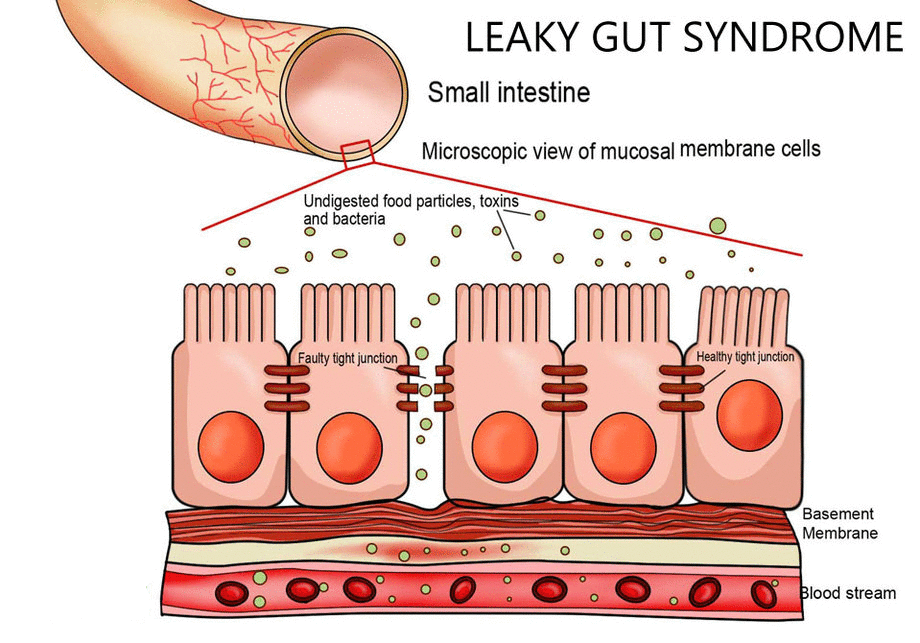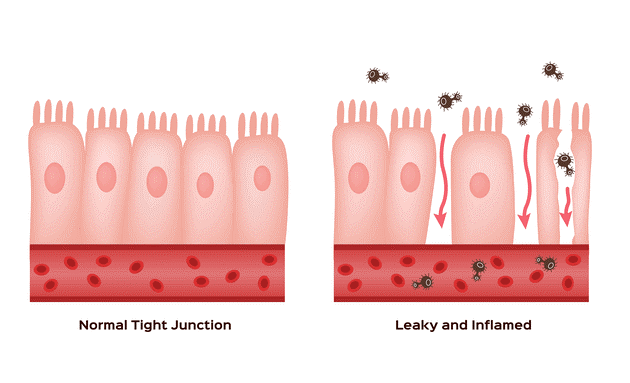Leaky Gut Syndrome: What Is It and How to Heal Your Gut Lining
Our bodies are like complex machines, and one critical part of this machine is our digestive system. It’s responsible for breaking down the food we eat and absorbing nutrients to keep us healthy. But sometimes, our digestive system can develop problems, and one of these problems is called “Leaky Gut Syndrome.” In this article, we will explore what Leaky Gut Syndrome is and learn about ways to heal your gut lining.
What Is Leaky Gut Syndrome?
Imagine your digestive system as a long, twisty tube. This tube, known as the gastrointestinal tract, has an important job. It helps your body absorb the good stuff from the food you eat, like vitamins and minerals, while keeping out harmful things like bacteria and toxins. This job is possible because of a tight barrier that lines your gut.
Leaky Gut Syndrome happens when this barrier becomes weak or damaged. Think of it as tiny holes or gaps forming in the lining of your gut. When this happens, things that should stay inside your gut can leak out into your bloodstream. These can include undigested food particles, bacteria, and other substances.
What Causes Leaky Gut Syndrome?
Several factors can contribute to Leaky Gut Syndrome:
- Diet: A poor diet high in processed foods, sugar, and unhealthy fats can harm the gut lining.
- Stress: Chronic stress can weaken the gut barrier over time.
- Medications: Some medications, like non-steroidal anti-inflammatory drugs (NSAIDs), can harm the gut lining.
- Infections: Certain infections can damage the gut lining.
- Imbalance in Gut Bacteria: An imbalance in the gut microbiome can lead to Leaky Gut Syndrome.
Symptoms of Leaky Gut Syndrome
Leaky Gut Syndrome is a bit tricky because its symptoms can vary from person to person. Some common signs may include:
- Digestive Issues: Many people with suspected Leaky Gut Syndrome report digestive problems such as bloating, gas, diarrhea, constipation, and irritable bowel syndrome (IBS)-like symptoms.
- Food Sensitivities: Individuals may develop new sensitivities or allergies to certain foods, leading to reactions like skin rashes, headaches, or digestive discomfort after eating specific items.
- Fatigue: Chronic fatigue or feelings of low energy are sometimes attributed to Leaky Gut Syndrome.
- Joint Pain: Some people report joint pain and inflammation, which they believe is linked to a “leaky” gut.
- Skin Problems: Conditions like acne, eczema, or other skin issues are sometimes connected to Leaky Gut Syndrome in anecdotal reports.
- Autoimmune Diseases: There is some speculation that increased intestinal permeability may contribute to the development or exacerbation of autoimmune diseases, such as rheumatoid arthritis, lupus, or celiac disease.
- Mood and Mental Health Issues: There is ongoing research into the potential links between gut health and mental health. Some individuals with Leaky Gut Syndrome may report symptoms like mood swings, anxiety, or depression.
- Headaches: Chronic headaches or migraines are occasionally associated with Leaky Gut Syndrome.
- Weight Fluctuations: Some individuals may experience unexplained weight gain or difficulty losing weight, which they attribute to gut health issues.
It’s important to emphasize that these symptoms are nonspecific, meaning they can be linked to various other health conditions or lifestyle factors. If you suspect you have Leaky Gut Syndrome or are experiencing these symptoms, it’s essential to consult a healthcare professional for a proper evaluation and diagnosis.

Healing Your Gut Lining
The good news is that you can take steps to heal your gut lining if you suspect you have Leaky Gut Syndrome. Here are some easy-to-follow tips:
1. Eat a Gut-Friendly Diet:
To heal your gut, focus on eating whole, unprocessed foods. Include plenty of fiber-rich fruits and vegetables, which support a healthy gut microbiome. Avoid or limit foods high in sugar, processed foods, and excessive alcohol.
2. Manage Stress:
Chronic stress can harm your gut lining. Practice stress-reducing techniques like meditation, yoga, or deep breathing exercises.
3. Consider Probiotics:
Probiotics are good bacteria that can help balance your gut microbiome. You can find them in foods like yogurt or take them as supplements.

4. Stay Hydrated:
Drinking enough water is crucial for digestive health. It helps keep the mucous lining of your gut healthy.
5. Get Enough Sleep:
Quality sleep is essential for overall health, including gut health. Aim for 7-8 hours of restful sleep each night.
6. Avoid Overuse of Medications:
If possible, reduce your use of medications that can harm your gut lining, especially NSAIDs. Consult with your healthcare provider for alternative options.
7. Consider a Low-FODMAP Diet:
Some people with IBS find relief by following a low-FODMAP diet, which restricts certain types of carbohydrates that can irritate the gut.
8. Consult a Healthcare Professional:
If you suspect you have Leaky Gut Syndrome or are experiencing severe symptoms, it’s essential to consult a healthcare professional. They can provide personalized advice and recommend appropriate tests or treatments.
Conclusion
Leaky Gut Syndrome may sound complicated, but it’s all about maintaining the health of your gut lining. By making some simple lifestyle changes, like eating a healthier diet, managing stress, and getting enough sleep, you can help heal your gut and improve your overall well-being. Remember, it’s always a good idea to consult with a healthcare professional for guidance tailored to your specific needs.
References:
- Harvard. (n.d.). Leaky Gut: What Is It, And What Does It Mean For You? Retrieved from https://www.health.harvard.edu/blog/leaky-gut-what-is-it-and-what-does-it-mean-for-you-2017092212451
- Healthline. (n.d.). The Leaky Gut Diet Plan: What To Eat, What To Avoid. Retrieved from https://www.healthline.com/nutrition/leaky-gut-diet
- Medanta. (n.d.). 11 Symptoms of Leaky Gut Syndrome. Retrieved from https://www.medanta.org/patient-education-blog/11-signs-you-have-the-leaky-gut-and-how-to-heal-it
- WebMD. (n.d.). Leaky Gut Syndrome: What Is It? Retrieved from https://www.webmd.com/digestive-disorders/features/leaky-gut-syndrome

